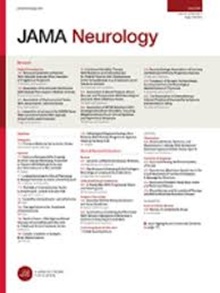Fremanezumab用于治疗偏头痛和共病性重度抑郁症患者
IF 20.4
1区 医学
Q1 CLINICAL NEUROLOGY
引用次数: 0
摘要
偏头痛和重度抑郁症经常并存;然而,评估预防性偏头痛治疗在两种疾病患者中的疗效的证据是有限的。目的评价fremanezumab治疗成人偏头痛合并重度抑郁症的疗效和安全性。设计、环境和参与者UNITE研究是一项双盲、安慰剂对照、平行组、随机临床试验,包括4周筛查期、12周双盲期和12周开放标签延期(OLE),于2020年7月9日至2022年8月31日进行。该试验在12个国家的55个中心进行。符合条件的患者是患有发作性偏头痛(EM)或慢性偏头痛(CM)的成年人,根据精神障碍诊断与统计手册(第五版)的标准,筛查前有12个月或以上的重度抑郁症病史,筛查时有活跃的抑郁症症状(9项患者健康问卷得分在10分或以上)。干预:患者按1:1随机分配,每月接受fremanezumab (225 mg)或匹配的安慰剂。OLE组所有患者每季度接受fremanezumab (675 mg)治疗。主要结局和测量主要终点是12周双盲期间每月偏头痛天数从基线的平均变化。结果540例患者中,353例患者(平均[SD]年龄42.9[12.3]岁;女性310例[88%];哦,48%;CM, 52%)符合条件,随机接受fremanezumab (n = 175)或安慰剂(n = 178)。在12周双盲期间,每月偏头痛天数的平均(SE)变化为- 5.1 (0.50;fremanezumab的95% CI, - 6.09至- 4.13)和- 2.9 (0.49;安慰剂的95% CI为- 3.89至- 1.96)(P <.001)。第8周汉密尔顿抑郁评定量表- 17项评分与基线相比的平均(SE)变化为- 6.0 (0.55;fremanezumab的95% CI,−7.10至−4.95)和−4.6 (0.54;安慰剂组95% CI,−5.66 ~−3.55)(最小二乘平均[SE]差:−1.4 [0.61];95% CI,−2.61 ~−0.22;P = .02)。不良事件与其他fremanezumab试验一致。结果在整个OLE中保持不变。结论和相关性:与安慰剂相比,fremanezumab治疗可显著减少每月偏头痛天数和抑郁症状。没有发现新的安全隐患。据作者所知,这是第一个安慰剂对照的随机临床试验,专门设计用于评估偏头痛和共病抑郁症患者,以证明通过单一药物干预可以显著改善偏头痛和抑郁症状。临床试验注册号:NCT04041284本文章由计算机程序翻译,如有差异,请以英文原文为准。
Fremanezumab for the Treatment of Patients With Migraine and Comorbid Major Depressive Disorder
ImportanceMigraine and major depressive disorder are frequently comorbid; however, evidence evaluating the efficacy of preventive migraine therapy in patients with both diseases is limited.ObjectiveTo evaluate the efficacy and safety of fremanezumab in adults with migraine and comorbid major depressive disorder.Design, Setting, and ParticipantsThe UNITE study was a double-blind, placebo-controlled, parallel-group, randomized clinical trial consisting of a 4-week screening period, 12-week double-blind period, and 12-week open-label extension (OLE), conducted between July 9, 2020, and August 31, 2022. The trial was conducted at 55 centers across 12 countries. Eligible patients were adults with episodic migraine (EM) or chronic migraine (CM), history of major depressive disorder according to Diagnostic and Statistical Manual of Mental Disorders (Fifth Edition) criteria for 12 or more months before screening, and active symptoms of depression (9-item Patient Health Questionnaire score of 10 or more) at screening.InterventionsPatients were randomized 1:1 to receive monthly fremanezumab (225 mg) or matched placebo. All patients in the OLE received quarterly fremanezumab (675 mg).Main Outcomes and MeasuresThe primary end point was the mean change from baseline in monthly migraine days during the 12-week double-blind period.ResultsOf the 540 patients screened for the study, 353 patients (mean [SD] age, 42.9 [12.3] years; 310 female [88%]; EM, 48%; CM, 52%) were eligible and randomized to receive fremanezumab (n = 175) or placebo (n = 178). Mean (SE) change from baseline in monthly migraine days during the 12-week double-blind period was −5.1 (0.50; 95% CI, −6.09 to −4.13) for fremanezumab and −2.9 (0.49; 95% CI, −3.89 to −1.96) for placebo (P &lt;.001). Mean (SE) change from baseline in the Hamilton Depression Rating Scale–17 Items score at week 8 was −6.0 (0.55; 95% CI, −7.10 to −4.95) for fremanezumab and −4.6 (0.54; 95% CI, −5.66 to −3.55) for placebo (least squares mean [SE] difference: −1.4 [0.61]; 95% CI, −2.61 to −0.22; P = .02). Adverse events were consistent with other fremanezumab trials. Results were maintained throughout the OLE.Conclusions and RelevanceTreatment with fremanezumab compared with placebo resulted in significant reductions in monthly migraine days and depressive symptoms. No new safety concerns were observed. To the authors’ knowledge, this was the first placebo-controlled, randomized clinical trial, specifically designed to assess patients with migraine and comorbid depressive disorder, to demonstrate significant improvements in migraine and depressive symptoms with a single pharmacological intervention.Trial RegistrationClinicalTrials.gov Identifier: NCT04041284
求助全文
通过发布文献求助,成功后即可免费获取论文全文。
去求助
来源期刊

JAMA neurology
CLINICAL NEUROLOGY-
CiteScore
41.90
自引率
1.70%
发文量
250
期刊介绍:
JAMA Neurology is an international peer-reviewed journal for physicians caring for people with neurologic disorders and those interested in the structure and function of the normal and diseased nervous system. The Archives of Neurology & Psychiatry began publication in 1919 and, in 1959, became 2 separate journals: Archives of Neurology and Archives of General Psychiatry. In 2013, their names changed to JAMA Neurology and JAMA Psychiatry, respectively. JAMA Neurology is a member of the JAMA Network, a consortium of peer-reviewed, general medical and specialty publications.
 求助内容:
求助内容: 应助结果提醒方式:
应助结果提醒方式:


